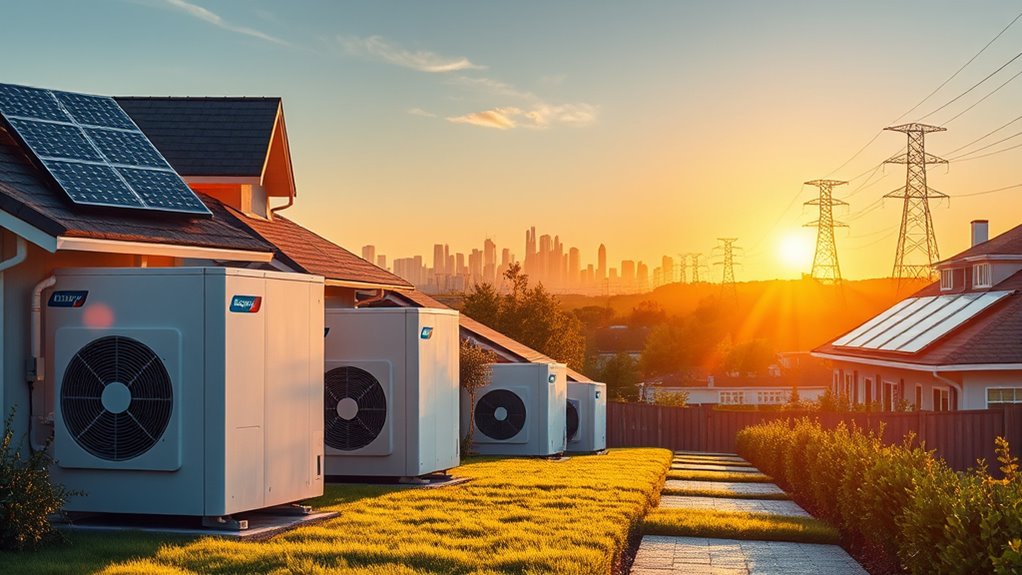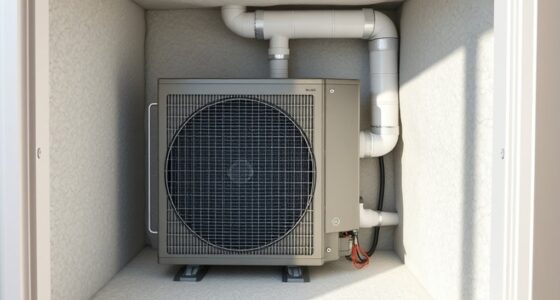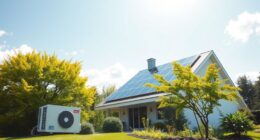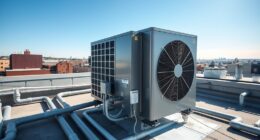Grid decarbonization means your heat pump uses electricity from cleaner, renewable sources like wind and solar. This reduces the environmental impact of your heating system and can lower your carbon footprint. As the grid becomes greener, your heat pump operates more efficiently and sustainably, especially when combined with smart grid technologies and infrastructure upgrades. If you want to see how these changes improve your energy use, keep exploring the details.
Key Takeaways
- Grid decarbonization shifts heat pump energy sources to cleaner, low-carbon electricity, reducing greenhouse gas emissions.
- Increased renewable energy integration can lower electricity prices during high renewable generation periods.
- Modernized grid infrastructure enables more efficient and reliable operation of heat pumps with cleaner energy.
- Smart grid technologies allow heat pumps to operate dynamically based on renewable energy availability.
- Overall, decarbonized grids enhance heat pump efficiency and sustainability, decreasing their environmental impact.

Have you ever wondered how shifting to cleaner energy sources can revolutionize our heating systems? As grid decarbonization accelerates, the energy powering your heat pump becomes greener and more sustainable. This shift hinges on two critical factors: renewable integration and infrastructure upgrades. When more renewable energy sources like wind and solar are integrated into the grid, the electricity used by your heat pump increasingly comes from low-carbon sources. This means your heating system can operate efficiently while substantially reducing greenhouse gas emissions. But to realize these benefits fully, the grid needs to undergo substantial infrastructure upgrades. Modernizing transmission lines, expanding renewable capacity, and deploying advanced energy storage ensure that clean energy is reliably available when your heat pump needs it most. These upgrades help balance supply and demand, preventing fluctuations that could otherwise increase reliance on fossil fuels during peak times.
Renewable integration and infrastructure upgrades make your heat pump greener and more efficient.
As renewable integration improves, your heat pump’s energy consumption profile shifts. Instead of relying on dirty, fossil-fuel-based electricity, it increasingly draws from cleaner sources, which reduces your carbon footprint. This transition can also influence energy prices, often lowering them during times of high renewable generation. With a more robust grid, your heat pump can operate more efficiently, taking advantage of periods when renewable energy is abundant. This not only reduces emissions but can also lead to cost savings, especially if your system is designed to optimize energy use based on grid conditions.
However, these changes require a proactive approach. Upgrading infrastructure isn’t just about adding new power lines; it involves deploying smart grid technologies that can intelligently manage loads and forecast renewable energy availability. These systems enable your heat pump to adapt dynamically, operating during times of surplus renewable power and reducing consumption when renewable generation dips. Such synchronization maximizes the environmental benefits of decarbonized electricity and enhances overall grid stability.
In essence, the transition to a decarbonized grid directly impacts your heat pump’s energy consumption and efficiency. The more renewable energy is integrated and the more infrastructure is upgraded, the greener your heating becomes. You’ll notice that your heat pump not only heats your home more sustainably but also becomes part of a larger effort to combat climate change. As these improvements continue, expect your heating system to operate cleaner, smarter, and more cost-effectively, demonstrating how decarbonization efforts create tangible benefits in everyday life.
Frequently Asked Questions
How Quickly Will Decarbonization Impact Heat Pump Efficiency?
Decarbonization will quickly improve heat pump efficiency as renewable integration increases and policy incentives encourage cleaner energy use. You’ll notice faster gains in efficiency because cleaner electricity reduces the carbon footprint and enhances performance. As policies support renewable adoption, your heat pump benefits from greener power, leading to more sustainable operation. This process accelerates as renewable sources become more prevalent, making your heat pump more efficient in the near term.
Are There Regional Differences in Decarbonization Effects on Heat Pumps?
Yes, there are regional disparities in how decarbonization affects heat pumps, mainly due to climate zones. In colder areas, decarbonization efforts can improve heat pump efficiency by reducing grid reliance on fossil fuels. Conversely, in milder regions, the impact may be less noticeable. You’ll find that climate zones profoundly influence the benefits you see from grid decarbonization, affecting both energy consumption and overall system performance.
What Are the Economic Benefits of Decarbonizing the Grid for Heat Pump Users?
Decarbonizing the grid benefits you like a rising tide lifting all boats, especially heat pump users. You can save money through renewable incentives and lower your energy bills as carbon pricing makes fossil fuels more expensive. These policies encourage cleaner energy, which reduces operational costs for heat pumps, ultimately leading to long-term savings and economic stability. Embracing decarbonization means more affordable, sustainable comfort for you.
How Does Grid Decarbonization Influence Future Heat Pump Technology Development?
Grid decarbonization drives future heat pump technology development by encouraging renewable integration and strengthening policy incentives. You’ll see more innovative, efficient heat pumps designed to optimize renewable energy use, reducing reliance on fossil fuels. These advancements result from policies promoting cleaner energy and investments in renewable infrastructure, making heat pumps more sustainable and cost-effective. As a result, you benefit from greener, more efficient heating options aligned with a decarbonized grid.
Will Decarbonization Reduce the Overall Operational Cost of Heat Pumps?
Decarbonization will likely reduce your heat pump’s operational costs because renewable integration lowers electricity prices over time. Additionally, policy incentives for clean energy encourage upgrades and efficiency improvements, saving you money in the long run. As the grid becomes greener, you benefit from cleaner, cheaper power, which helps offset maintenance and energy expenses, making your heat pump more affordable to operate overall.
Conclusion
As the grid decarbonizes, your heat pump’s energy consumption drops, your carbon footprint shrinks, and your environmental impact lessens. As cleaner electricity flows through the grid, your home becomes more efficient, your costs decrease, and your sustainability improves. Embrace the shift toward renewable energy, embrace the benefits of lower emissions, and embrace a greener future. With each step toward decarbonization, you’re not just improving your home—you’re helping create a cleaner, healthier planet for everyone.








